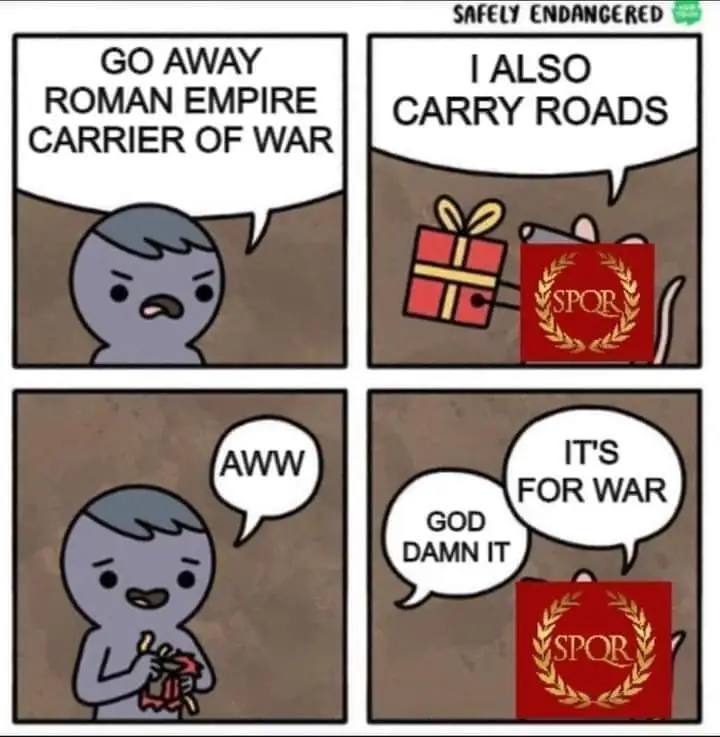this post was submitted on 18 Jul 2024
195 points (97.6% liked)
Rough Roman Memes
470 readers
39 users here now
A place to meme about the glorious ROMAN EMPIRE (and Roman Republic, and Roman Kingdom)! Byzantines tolerated! The HRE is not.
RULES:
-
No racism, sexism, homophobia, transphobia, bigotry, etc. The past may be bigoted, but we are not.
-
Memes must be Rome-related, not just the title. It can be about Rome, or using Roman aesthetics, or both, but the meme itself needs to have Roman themes.
-
Follow Lemmy.world rules.
Not sure where to start on Roman history?
A quick memetic primer on Republican Rome
A quick memetic primer on Imperial Rome
founded 6 months ago
MODERATORS
you are viewing a single comment's thread
view the rest of the comments
view the rest of the comments

They gave us the aquaduct
It’s the road for water… for war.
And they didn't understand how it worked either. They just took what the Greeks did and copied it, but bigger.
What.
Lord. Where to begin?
... yes, because roads were:
A. Meant to get troops from point A to point B in the shortest possible time
and
B. Regulated in such a way as to afford greater size when curving, for reasons of safety and traffic density, and thus necessitating more materials, making straight roads preferred.
Holy fucking shit. Is this guy really implying that Greek military camps were better laid out for following the terrain and saying that the standardized castra was 'decreed by the military bureaucracy' regardless of terrain?
Is it... is it unclear that Hero of Alexandria, taking a 1st century AD date for his life (not universally accepted, but one I agree with), being in Alexandria, was literally living in the Roman Empire?
Holy shit, how does one write about this without ever having read De Aqueductu? Frontinius clearly writes with an understanding that velocity adjusts the volume of the flow. They (and 'they' includes the Greeks) just had no reliable mathematical models or tools to measure it until the 19th fucking century.
Not to mention, the Greeks weren't know for being particularly egalitarian or peace-loving either. They were big on pretty and graceful things... to show off their tremendous slave wealth. I'd guess that the main reason we even talk about them, instead of any of the other ancient civilisations, is that the "gangster" Romans simped for them enough to preserve a decent amount of their literature into the middle ages, which then found it's way to the present.
Also, Roman roads were frequently straight, but not always. This Beckmann guy seems to think they would just send them straight up over one of the snow-capped peaks of the alps. They would allow some really steep grades, sure, but not unlimited grade, either in intensity or cumulative extent.
To be fair, I think that the author had a particular bitterness towards Rome for their killing of Archimedes. So, might not be the most unbiased - and looking into him further, he clearly had other questionable leanings.
Yeah, it feels like he's trying to push Rome into a pre-determined box. Rome had a lot of weaknesses and flaws - but engineering? They were damn good at that. And in their defense, General Marcellus gave orders for Archimedes to be taken alive because of Marcellus's respect for his genius, and it was only an impetuous soldier who caused Archimedes' death.
It's funny - the Greeks regarded the theories which enabled engineering higher than engineering itself, which was seen as only slightly above menial labor; while the Romans disdained the theorycrafting but highly respected the practical, engineering side of things. There are very few Roman contributions to mathematic theory, unlike the Greeks, but some of our best sources for the architecture and practical application of mathematical theory of the Classical world is penned by Roman hands.
Okay, other than war, roads, and the aquaduct what did they ever give us?
A..and the sanitation.